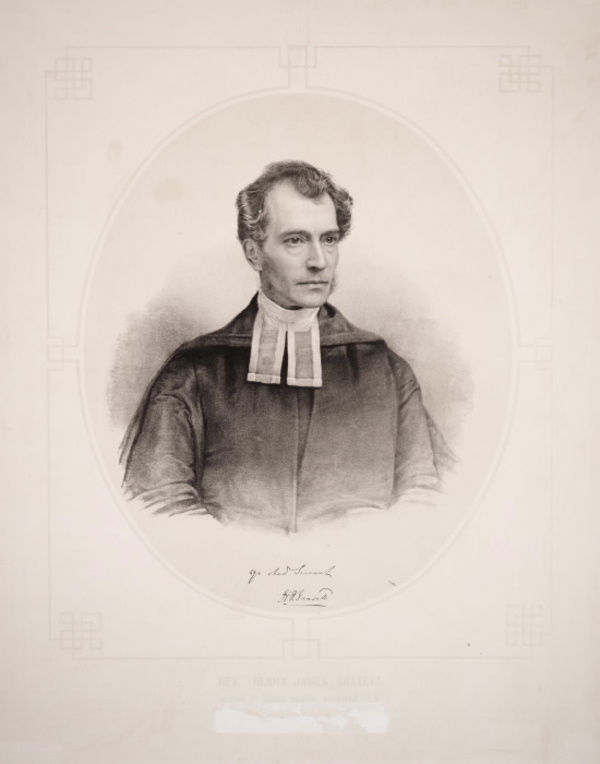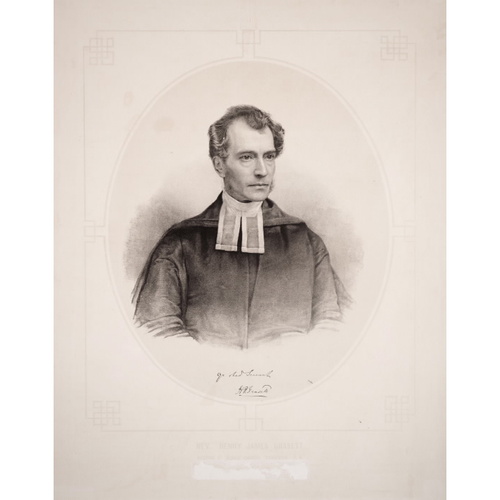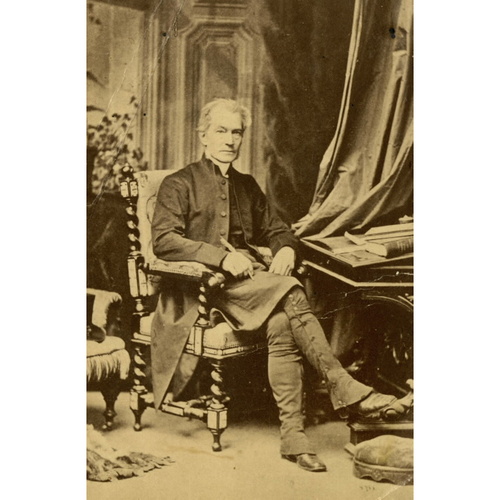As part of the funding agreement between the Dictionary of Canadian Biography and the Canadian Museum of History, we invite readers to take part in a short survey.

Source: Link
GRASETT, HENRY JAMES, Church of England clergyman and educator; b. 18 June 1808 at Gibraltar, the eldest of the 14 children of Henry Grasett, surgeon to the 48th Foot, and Ann Bligh Stevenson; m. 17 Oct. 1837 Sarah Maria, daughter of John Stewart*, president of the Executive Council of Lower Canada, and they had eight children; d. 20 March 1882 in Toronto, Ont.
Henry Grasett brought his family to Quebec City in 1814 and Henry James was educated there at the Royal Grammar School. From about 1825 to 1830, supported by a scholarship from the Society for the Propagation of the Gospel, Grasett studied theology under Bishop Charles James Stewart*. In 1830 he enrolled at St John’s College, Cambridge, from which he received his ba in 1834 (ma in 1842, bd in 1853, and an honorary dd in 1877). He returned to Quebec the same year and was ordained deacon on 19 May 1834 and priest on 8 June 1835 by Bishop Stewart. In 1835 Grasett began his long career in Toronto as curate to the rector at St James, John Strachan*. Grasett became domestic and examining chaplain to Strachan in 1839, rector and chaplain to the garrison in 1847, and dean in 1867. Despite differences in their churchmanship, during all these years Grasett worked closely with Strachan. Both men – the first bishop and the first dean of Toronto – are buried beneath the altar of St James’.
Like many 19th-century clerics, Grasett was deeply involved in education. Probably through Strachan’s influence he joined the Home District Board of Education in the 1840s and was its chairman by annual election from 1851 until his death. Two of its noteworthy achievements were the establishment in 1871 of the Toronto (later Jarvis) Collegiate Institute and the appointment of Archibald MacMurchy as “rector” of the school which became known for its academic excellence. Grasett also participated in education at the provincial level. On Strachan’s recommendation to Egerton Ryerson, Grasett was appointed in 1846 to the newly established Board of Education for Upper Canada (renamed the Council of Public Instruction in 1850), which was to assist the superintendent of education in organizing and operating the public school system. He remained on the council until it was replaced by the Department of Education in 1875, and was occasionally its chairman. In 1872 Grasett, as chairman, summarized the achievements of the council on the occasion of an official visit to Toronto by the governor general, Lord Dufferin [Blackwood*]: the establishment of normal and model schools, the preparation of laws and regulations to govern the school system, the selection and authorization of textbooks and prizebooks, the inauguration of school libraries, and immense improvements in school accommodations and in the character, qualifications, and pedagogical methods of teachers. Throughout, Grasett said, “it has been our aim to devise and develop a System of sound universal Education on Christian principles, imbued with a spirit of affectionate loyalty to the Throne and attachment to the unity of the Empire.”
Grasett’s tall, slightly stooping figure hurrying along Toronto streets was a familiar sight, and his kindness and generosity made him many friends. Yet he was shy and diffident in his public manner, and almost inarticulate in extemporaneous address. His sermons, while clear and flowing, were designed to appeal to the intellect rather than the emotions. It was his churchmanship that accounted for his wide popularity with Anglican laymen in Toronto. At a time when most of the clergy in the Toronto diocese were high church, Grasett had a low church orientation, which he probably owed to his early training by Stewart and to the religious atmosphere of St John’s College. He served in the 1850s and 1860s as a prominent executive member of the non-denominational Upper Canada Tract and Upper Canada Bible societies, both of which were shunned by high churchmen. The Protestant atmosphere and furnishings of St James’ Cathedral in Toronto, for which he was responsible, were sources of annoyance to high churchmen. As a member of the corporation of Trinity College, Grasett supported Bishop Benjamin Cronyn* of the diocese of Huron in his attack on the high church theology of Provost George Whitaker. In 1866 Grasett was an unsuccessful low church candidate in the election of a coadjutor bishop for the diocese.
As the diocese’s most outstanding cleric in the low church group, Grasett became a leader of a new, militant campaign to counter the progress of ritualism. He was president of the Evangelical Association established in 1869 to arouse the Protestantism of laymen. When the Evangelical Association was superseded in 1873 by the Church Association of the Diocese of Toronto, he helped write its constitution and served as the only clergyman among the three vice-presidents. The Church Association included some of Toronto’s most prominent Anglican laymen of the time: William Henry Draper*, Casimir Stanislaus Gzowski*, Daniel Wilson*, Edward* and Samuel Hume Blake*, George Taylor Denison*, and John George Hodgins*. In the 1870s their efforts were remarkably energetic and successful. A massive propaganda campaign was undertaken, as part of which the Evangelical Churchman was established in 1876 and a mission fund set up to support new evangelical ministers. The fund was outside the control of the diocesan synod despite the protests of the bishop, Alexander Neil Bethune*. Grasett was a member of the fund’s committee, and in the spring of 1875 Bethune singled him out for investigation before a commission, appointed by the bishop, on charges of “depraving” the doctrine and discipline of the church. The charges were eventually dropped because no canon law had been broken, but only after months of violent newspaper controversy.
When Bethune died in 1879 the Church Association could claim credit for the choice of his successor. It organized a large block of lay delegates at the episcopal election, in which a candidate had to win a majority of both lay and clerical votes. For the first 23 ballots, with first George Whitaker and then Joseph Albert Lobley receiving about 80 per cent of the votes from the clergy, the laymen prevented the selection of a high church candidate. Arthur Sweatman*, a moderate evangelical, finally obtained a majority from the clergy on the understanding that following his election the Church Association would be disbanded. During the election Grasett had provided St James’ parish hall to the association for rallies and meetings.
Grasett was no doubt gratified by the election of Sweatman, but he had probably received more satisfaction from having been chosen chairman of a Church Association committee on clerical education in the fall of 1874. Distrusting Trinity College, evangelicals wanted a seminary of their own. Under Grasett’s anxious guidance and despite Bethune’s hostility, the committee made the Protestant Episcopal Divinity School a reality by October 1877. Principal James Paterson Sheraton* and a small staff had begun conducting classes in St James’ that summer for nine ordination candidates. Grasett was one of the trustees of the school and taught pastoral theology. At the time of his death the institution (renamed Wycliffe College in 1885) was about to move into its own new buildings on Queen’s Park.
The founding of the divinity college brought together the two strands of Grasett’s public life, education and Protestant Christianity. Although an Anglican clergyman, he rejected historical and theological arguments thrusting in the direction of Catholicism. He firmly repudiated the doctrine of apostolic succession, and defined the visible church of Christ in broad and comprehensive terms. Wycliffe College was intended to perpetuate evangelical Protestantism within the church, and it was precisely because he shared this orientation that Grasett was able to associate in Toronto and on the provincial council with men of all other Protestant denominations in constructing the public school system of Ontario on the basis of their common Christian principles.
AO, RG 2, B-3; Strachan (John) papers. Toronto Board of Education, Education Centre Library, Reference Services, Hist. Coll., County Grammar School Board, Minutes, 1851–82. A. N. Bethune, Memoir of the Right Reverend John Strachan, D.D., LL.D., first bishop of Toronto (Toronto and London, 1870). Church Assoc. of the Diocese of Toronto, Occasional paper ([Toronto]), [1873–75]. Doc. hist. of education in U.C. (Hodgins), I, IX, XXIV, XXVIII. Dominion Churchman (Toronto), 1875–79. Echo and Protestant Episcopal Recorder (Port Hope, [Ont.], and Toronto), 1853–63. Evangelical Churchman (Toronto), 1876–79. Globe, 1850–82. Toronto Daily Mail, 1860–82. Chadwick, Ontarian families. Centennial story: the Board of Education for the city of Toronto, 1850–1950, ed. H. M. Cochrane (Toronto, 1950). T. R. Millman, The life of the Right Reverend, the Honourable Charles James Stewart, D.D., Oxon., second Anglican bishop of Quebec (London, Ont., 1953). V. E. Parvin, Authorization of textbooks for the schools of Ontario, 1846–1950 ([Toronto], 1965). H. E. Turner, “The evangelical movement in the Church of England in the diocese of Toronto, 1839–1879” (ma thesis, Univ. of Toronto, 1959).
Cite This Article
H. E. Turner, “GRASETT, HENRY JAMES (1808-82),” in Dictionary of Canadian Biography, vol. 11, University of Toronto/Université Laval, 2003–, accessed April 1, 2025, https://www.biographi.ca/en/bio/grasett_henry_james_1808_82_11E.html.
The citation above shows the format for footnotes and endnotes according to the Chicago manual of style (16th edition). Information to be used in other citation formats:
| Permalink: | https://www.biographi.ca/en/bio/grasett_henry_james_1808_82_11E.html |
| Author of Article: | H. E. Turner |
| Title of Article: | GRASETT, HENRY JAMES (1808-82) |
| Publication Name: | Dictionary of Canadian Biography, vol. 11 |
| Publisher: | University of Toronto/Université Laval |
| Year of revision: | 1982 |
| Access Date: | April 1, 2025 |




